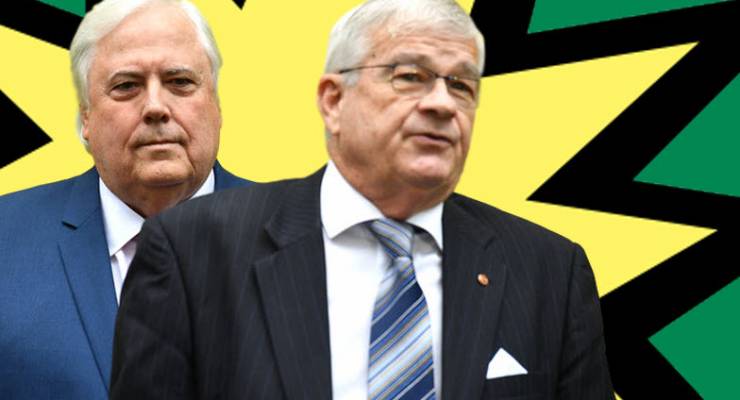
So Clive Palmer is back, almost as if he’d never been away. The man who once commanded the key Senate swing party (so to speak), only for it to implode before our very eyes in, well, exactly the way we all expected, is now taking other party’s leftovers.
One Nation cast-off Brian Burston is now Palmer’s “Senate leader”, a gig surely even the least competent politician could manage given he only has to lead himself. Erstwhile party colleague Peter Georgiou has nearly as easy a gig, having been elevated, if that’s the right word, to the enviable status of One Nation Whip in a party of two. Admittedly, given Pauline Hanson’s tendency to not bother showing up to work in Canberra, it may have the occasional challenge.
How long before Georgiou goes his own way, and Burston and Palmer fall out? Perhaps Georgiou could then join Palmer, and Burston could move on to the Katter Party, where momentary former colleague Fraser Anning now uneasily resides. Or he could team up with Jacqui Lambie (sure to return to the Senate at the next election); not to be confused with former colleague Steve Martin, who’s started his own Tasmanian Nationals sub-branch. Or there’s Cory Bernardi’s outfit. The Senate is a giant physics experiment with particles flying about, momentarily deviated from their path by the gravity of heavier objects, before flying off again, pinging into other particles on other trajectories. Actual policies are only a minor byproduct of this process, the Higgs boson of the taxpayer-funded Large Ego Collider installed in the western side of Parliament House.
That Palmer has returned to politics — although whether he’ll actually stand again for election must surely be doubted — is at first blush surprising given how spectacularly his first effort blew up, as well as his subsequent adventures in nickel. But Pauline Hanson endured an even bigger flame-out in Queensland state politics in the 1990s and kept at it. She, of course, was doing it for a living, reaping millions from taxpayers for her 5-10% of the vote, and Palmer claims he’s not in need of a quid. But Bob Katter has been doing it nearly as long as Hanson, having bailed on the Nationals in 2001.
They’re all in the same game, trying to tap into the energy of populist discontent with political modernity, an energy that waxes or wanes in the electorate, depending on circumstances, and which has waxed strongly at the last two federal elections. But because minor parties are inherently unstable, they can’t handle the result of successfully tapping into that energy — they burst, firing senators off in all directions. And so the process continues.
It’s an endless cycle of discontent, electoral expression and political fragmentation that means yesterday’s kingmaker is tomorrow’s answer to a political trivia question and next decade’s swing vote, in which the same names can keep circulating if they have any sort of brand recognition. Voters, even more than the press, aren’t very good at remembering how it all went sour last time around, how the election night cheers and backslapping turned to Sky News tears, “in a letter obtained exclusively by The Australian” and tweeted recriminations. All just the emotional energy given off by the collision of political particles.








Malcolm Frankenstein’s DD monstrosity – where you only need half the quota of chromosomes to be a Senator …… and “company tax cuts mean higher wages”.
“Unrepresentative swill” is now officially archived as the official descriptor for this circus. Bravo Bernard.
You have to wonder why Burston would go with Palmer after falling out with Hanson – swapping one oddball for another. My guess is the objective is re-election – this would be impossible as an independent but he hopes the Palmer name & money is his only hope. Hardly a bright outlook.
Large Ego Collider – stop it, you’re hurting me
I tend to think of it as the Large Hard-on Collider.
Bernard,
“the Higgs boson of the taxpayer-funded Large Ego Collider “. Pure genius BK. Worth my subscription.
Rod Deakin
Absolutely. For me too. Brilliant.